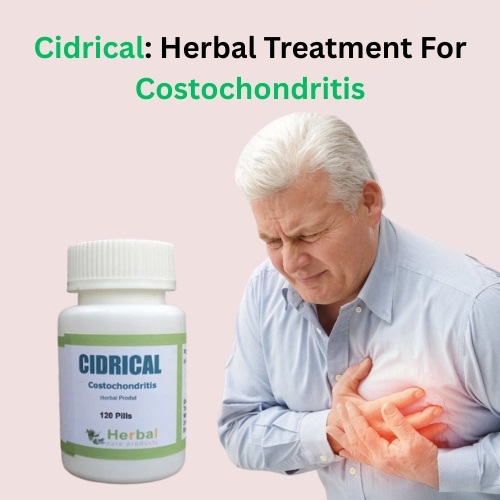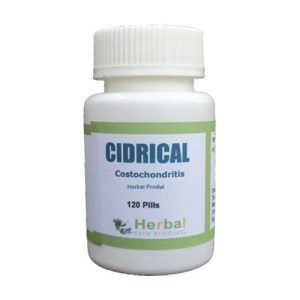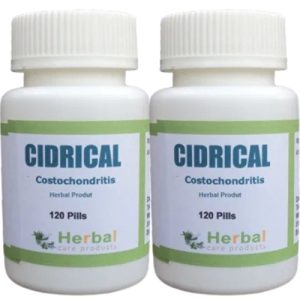Costochondritis—a painful inflammation of the cartilage connecting the ribs to the sternum—is often treated with NSAIDs, physical therapy, or steroids. Herbal products are increasingly sought as a complementary or natural alternative. One such offering is Cidrical, sold by Herbal Care Products, which positions itself as a 100 % natural herbal supplement specifically formulated for costochondritis. Priced between $119.99 and $169.99 depending on tablet count, Cidrical claims to target inflammation, chest pain, and cartilage repair.
What is Costochondritis?
Costochondritis is inflammation of the costal cartilage (where ribs meet the sternum), commonly causing sharp or aching chest pains that mimic serious heart conditions. Symptoms often include:
- Localized tenderness on palpation
- Pain worsened by movement, deep breathing, or pressing on the sternum
- Absence of swelling (which differentiates it from Tietze syndrome)
The condition is usually benign, often resolving within weeks, though some cases persist for months.

What is Cidrical?
Cidrical is an herbal supplement marketed for costochondritis— inflammation and pain in the cartilage connecting ribs to the sternum. The featured product is Cidrical — branded as a Herbal Treatment For Costochondritis and part of Natural Remedies for Costochondritis. Key details:
- Offered in 120 or 240‑tab format, priced between $119.99–$169.99
- Marketed to reduce inflammation, ease chest pain, repair cartilage, support breathing, and enhance mobility
Claimed Ingredients:
- Arillus myristicae (nutmeg-related)
- Elephant creeper
- Nutmeg
- Saffron
- Serpentine
These herbs are traditionally associated with anti-inflammatory and pain-relief effects, though peer-reviewed clinical data specific to costochondritis remains limited.
The brand claims Cidrical:
- Reduces chest‑wall pain and inflammation,
- Supports healthy heart rhythm (unusual positioning),
- Eases other inflammatory disorders like gout and arthritis.
Ingredient Snapshot: How They May Work
- Arillus Myristicae & Nutmeg: Nutmeg has anti-inflammatory compounds (e.g., myristicin) studied for pain relief.
- Elephant Creeper & Serpentine: Less-known in Western herbalism, but used traditionally for rheumatic pain.
- Saffron: Contains crocin and safranal, which exhibit antioxidant and mood-supportive properties—helpful if chronic pain triggers tension.
Together, this blend aligns with the Natural Remedies for Costochondritis approach: reduce inflammation, support cartilage, and ease pain without side effects.
Strengths of Cidrical
1. Focused Herbal Blend
The formula includes traditional anti‑inflammatory botanicals—nutmeg, saffron, elephant creeper—which have centuries of use in herbal medicine.
2. Convenience
Blue‑pill format means no measuring powders or teas—simply two pills daily, as advised.
3. Multi‑Condition Claims
Beyond costochondritis, it’s also pitched for joint/muscle inflammation, potentially offering broader use.
4. Natural Alternative
For those avoiding NSAIDs due to side effects, a natural solution with fewer systemic impacts may be appealing .
Integrating Cidrical into a Natural Costochondritis Routine
- Medical Check-Up First
Never self-treat chest pain. Get a physical exam and imaging to rule out heart, lung, or bone issues. - Follow Dosage and Monitor Effects
Start with the recommended dose on the label. Track your symptoms and any side effects over 2–4 weeks. - Pair with Proven Natural Remedies
- Heat/Cold therapy daily: relax muscles, reduce inflamed tissue
- Stretch, posture, PT exercises: build chest stability
- Anti-inflammatory diet: veggies, omega-3s, turmeric, ginger
- Topical + Tools (Optional)
- Consider capsicum gel or lidocaine patches
- Use posture tools or massage devices (like Costoblock) to ease tension
- Track Progress & Adjust
Most costochondritis cases improve in ~3 weeks with rest and NSAIDs . If pain remains, consult your doctor before continuing supplements alone.
Understanding Ingredients & “Uses and Benefits”
The formulas’ key ingredients—Arillus Myristicae (nutmeg), Elephant Creeper, Saffron, Serpentine, and more—are traditional anti-inflammatory botanicals. While clinical data on this exact blend is limited, research on comparable herbs shows potential benefits.
1. Nutmeg (Myristica fragrans)
- Traditionally used for its warming and pain-relieving effects.
- Modern studies suggest its essential oils exhibit anti-inflammatory activity.
2. Elephant Creeper (Aristolochia or Dioscorea species?)
- Less commonly cited, but traditional anti-inflammatory uses are common in Ayurvedic or Chinese medicine.
3. Saffron
- Known for antioxidant and anti-inflammatory compounds (e.g., crocin), with emerging evidence in chronic pain modulation.
4. Serpentine
- Likely sourced from serpentine minerals, potentially delivering magnesium, which is linked to muscle relaxation and pain relief.
5. Ayurvedic Cross-Reference
Complementary practices—like ginger, turmeric, boswellia, and omega‑3—are well-supported in functional and Ayurvedic medicine. The website also promotes general natural approaches such as heat, cold, supplements, stretching, herbs, oils, posture correction, and stress reduction. Many of these align with Cidrical’s philosophy of anti-inflammatory and cartilage-supportive therapy.
“Uses and Benefits” – Detailed Breakdown
Use: Inflammation Reduction
- Benefit: May reduce chest wall inflammation, pain, rigidity
- Mechanism: Natural inhibitors of COX enzymes, antioxidant properties in turmeric, ginger, boswellia, and saffron
Use: Pain Relief
- Benefit: Alleviates sharp/sternum pain during breathing or movement
- Mechanism: Proven analgesic effects in ginger, boswellia, saffron; magnesium offers muscle relaxation
Use: Cartilage Support & Healing
- Benefit: Assists cartilage repair at costosternal joints
- Mechanism: Herbs like turmeric, boswellia, and glucosamine (in functional protocols) are shown to support collagen and cartilage structure
Use: Improved Breathing & Mobility
- Benefit: Deep breathing becomes easier, better exercise tolerance
- Mechanism: Reducing inflammation and muscle tightness supports chest expansion
Use: Overall Stamina & Soft-tissue Health
- Benefit: Enhanced exercise tolerance, reduced shoulder/arm pain
- Mechanism: Holistic support via anti-inflammatory nutrition and possible nutrient‑mineral supplementation (e.g., magnesium)
Usage Protocol & Safety
Directions
- Dosage: 2 tablets daily after breakfast with water or warm milk
- Instructions: Avoid taking on empty stomach; no cold drinks with tablets; follow consistent usage to support healing
Safety & Precautions
- Nature-derived: No artificial chemicals claimed
- Herbal interactions: Ginger, saffron, nutmeg can interact with blood thinners, diabetes meds, etc.—medical consultation is advised
- Allergies: Discontinue use if adverse reactions appear; they offer a money-back guarantee
Pros & Cons Summary
| ✅ Pros | ❌ Cons |
| Formulated with inflammation-supporting herbs | Lack of large-scale clinical trials |
| All-natural ingredients, free of pharmaceuticals | Pricey ($120–170 range) |
| Multiple claimed benefits: pain relief, cartilage repair, breathing ease | |
| Optional size choices (120/240 tabs) |
Summary & Recommendation
Cidrical may be a valuable Herbal Treatment For Costochondritis within a broader natural pain management plan. Its botanical blend aligns with popular Natural Remedies for Costochondritis, offering a safe alternative to systemic NSAIDs. However, it lacks clinical trials specific to costochondritis and comes at a higher cost.
- Pair with evidence-backed remedies (heat/cold, diet, movement).
- Consult your doctor—especially if taking medications like blood thinners.
- Monitor symptom relief and quality of life improvements.
For someone seeking a plant-based approach and willing to invest in long-term natural care, Cidrical is a promising option worth considering.
Final Verdict
Herbal Treatment For Costochondritis, like Cidrical, offers a promising supportive strategy. Its natural blend targets inflammation, pain, and cartilage health. Although clinical proof is limited, integrating it into a holistic regimen—with diet, posture correction, stretching, and proper rest—can support recovery.
If you’re seeking a gentler, plant-based supplement to complement conventional care, Cidrical is among the most targeted products available. Just be mindful of ingredient interactions and consult your doctor before starting.






